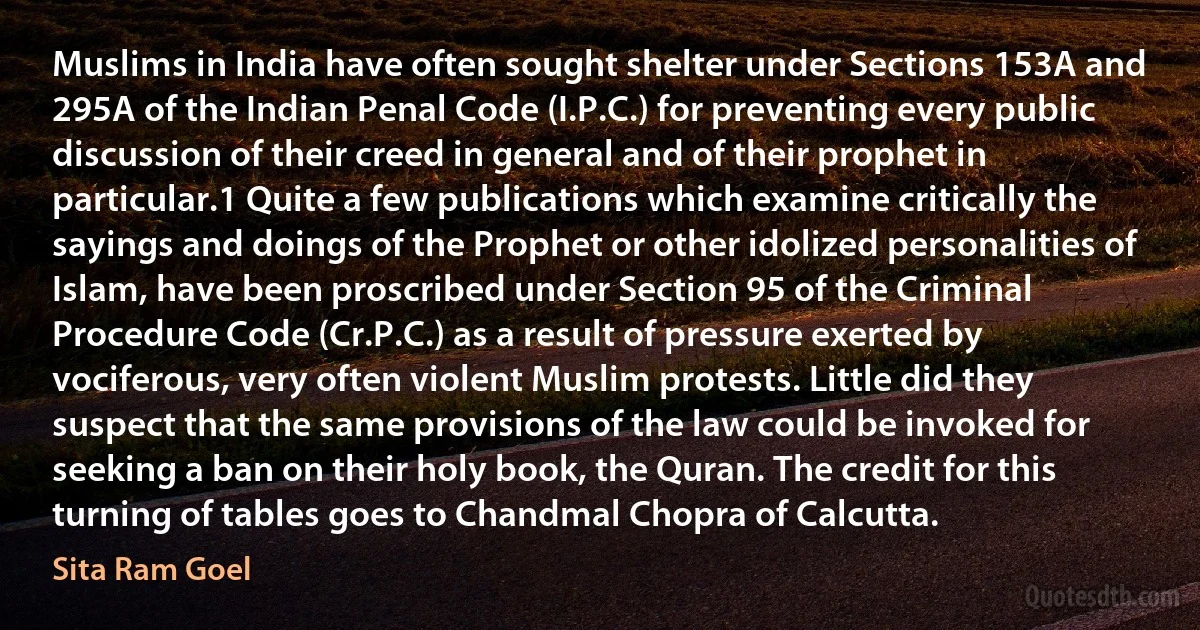
Muslims in India have often sought shelter under Sections 153A and 295A of the Indian Penal Code (I.P.C.) for preventing every public discussion of their creed in general and of their prophet in particular.1 Quite a few publications which examine critically the sayings and doings of the Prophet or other idolized personalities of Islam, have been proscribed under Section 95 of the Criminal Procedure Code (Cr.P.C.) as a result of pressure exerted by vociferous, very often violent Muslim protests. Little did they suspect that the same provisions of the law could be invoked for seeking a ban on their holy book, the Quran. The credit for this turning of tables goes to Chandmal Chopra of Calcutta.
Sita Ram GoelRelated topics
ban book code credit creed few general holy islam law procedure prophet public quite quran result seek seeking shelter suspect turning under calcuttaRelated quotes
Human relations are so integrated that no state can have complete freedom of action under its principles unless the same principles are not in force in a neighbouring country. Therefore, a, ‘Muslim Party' will not be content with the establishment of Islam in just one area alone –both for its own safety and for general reform. It should try and expand in all directions. On one hand it will spread its ideology; on the other it will invite people of all nations to accept its creed, for salvation lies only therein. If this Islamic state has power and resources it will fight and destroy non-Islamic governments and establish Islamic states in their place.

Abul Ala Maududi
Aspects of the Muslim Brotherhood's ideology and activities therefore run counter to British values of democracy, the rule of law, individual liberty, equality and the mutual respect and tolerance of different faiths and beliefs. The Muslim Brotherhood is not the only movement that promotes values which appear intolerant of equality and freedom of faith and belief. Nor is it the only movement or group dedicated in theory to revolutionising societies and changing existing ways of life. But I have made clear this government's determination to reject intolerance, and to counter not just violent Islamist extremism, but also to tackle those who create the conditions for it to flourish.

David Cameron
When one speaks of America, millions of Germans think of their relatives who either recently or long ago left their German homeland to seek their fortune in the "New World.” When someone succeeded in quickly making a lot of money in America, people said he had made his fortune. The result was that the "rich uncle” in America was envied and his nephews and nieces were encouraged to join the fortune-seeker. Seeking fortunes in America led to Germany losing people, and the American continent received many people whose contributions are particularly clear in the agricultural and technical fields. That these people and their descendants now give great help to the enemies of Germany in this Second World War is a tragic fact.

Julius Streicher
A pure Democracy, by which I mean a Society consisting of a small number of citizens, who assemble and administer the Government in person, can admit of no cure for the mischiefs of faction. A common passion or interest will, in almost every case, be felt by a majority of the whole; a communication and concert result from the form of Government itself; and there is nothing to check the inducements to sacrifice the weaker party, or an obnoxious individual. Hence it is, that such Democracies have ever been spectacles of turbulence and contention; have ever been found incompatible with personal security, or the rights of property; and have in general been as short in their lives, as they have been violent in their deaths.

James Madison
Each province has got a speciality of its own, I admit, but over and above that, all these different provinces are bound together in one common culture... If the whole of the Hindu races are bond up in that way you must also realise that the whole of the Mahomedan races all over India are also similarly bound up together and we must not forget that the two great cultures must meet together, and the result will be a great culture which is not purely Hindu, not purely Mahomedan but something which is made up of the contact of these two great races. And that is the ideal of Indian Nationality which must be preserved and developed to the fullest extent.

Chittaranjan Das
